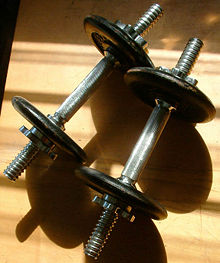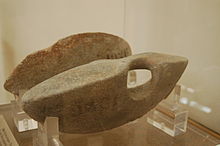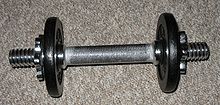- Dumbbell
-
For other uses, see Dumbbell (disambiguation).
The dumbbell, a type of free weight, is a piece of equipment used in weight training. It can be used individually or in pairs (one for each hand).
Contents
History
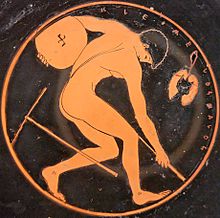 Young boy holding a discus at the palaestra. Near him, a pick to prepare the landing ground for the long jump and a pair of dumbbells (halteres) used to maintain equilibrium during the jump. Interior of an Ancient Greek Attic red-figure kylix, 510–500 BC, Louvre Museum, Paris.
Young boy holding a discus at the palaestra. Near him, a pick to prepare the landing ground for the long jump and a pair of dumbbells (halteres) used to maintain equilibrium during the jump. Interior of an Ancient Greek Attic red-figure kylix, 510–500 BC, Louvre Museum, Paris. Dumbbells (halteres) used in athletic games in ancient Greece, National Archaeological Museum, Athens.
Dumbbells (halteres) used in athletic games in ancient Greece, National Archaeological Museum, Athens.
The forerunner of the dumbbell, halteres, were used in ancient Greece as lifting weights[1][2] and also as weights in the ancient Greek version of the long jump.[3] A kind of dumbbell was also used in India for more than a millennium, shaped like a club – so named Indian club. The design of the "Nal", as the equipment was referred to, can be seen as a halfway point between a barbell and a dumbbell. It was generally used in pairs, in workouts by wrestlers, bodybuilders, sports players, and others wishing to increase strength and muscle size.
Etymology
"Dumbbells" as a word originated in Tudor England – referring to equipment simulating the action of a bell rope for the purpose of developing technique, and especially strength, for the purpose of practicing English bellringing (see Change Ringing), but without making a noise (hence dumb). When strongmen started to make their own equipment, they kept the name, even though the shape and form changed. See Oxford dictionary definition.
Types
By the early 17th century, the familiar shape of the dumbbell, with two equal weights attached to a handle, had appeared. There are currently three main types of dumbbell:
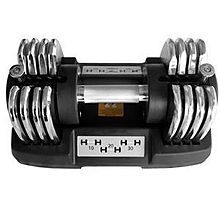 A "selectorized" adjustable dumbbell of 50 lbs with 10 pound weight increments.
A "selectorized" adjustable dumbbell of 50 lbs with 10 pound weight increments.
- Adjustable dumbbells consist of a metal bar whose centre portion is often engraved with a crosshatch pattern (knurling) to improve grip. Weight disks (plates) are slid onto the outer portions of the dumbbell and secured with clips or collars. Shown to the right is a "spinlock" dumbbell, whose ends are threaded to accept large nuts as collars. Alternatively, a dumbbell may have smooth ends with plates being secured by a sprung collar. Nowadays, many commercially sold dumbbells are available with sophisticated, and easy-to-use methods for weight increments adjustments. This is meant to afford ease of use, thus preventing the need to stop workouts in order to raise or lower the weights.
- Fixed-weight dumbbells are weights created in a dumbbell shape. Inexpensive varieties consist of cast iron, sometimes coated with rubber or neoprene for comfort, and even cheaper versions consist of a rigid plastic shell that is filled with concrete.
- "Selectorized" dumbbells are adjustable dumbbells whose number of plates (i.e. weight) can be easily changed when it's resting in its stands. This is achieved by adjusting the number of plates that follow the handle when lifted, e.g. by turning a dial or moving a selector pin — rather than manually adding or removing plates. This makes it very easy to change the weight of the dumbbell between exercises, and the stand typically doubles as storage for the additional weights not being used for a particular exercise.
References
- ^ Norman Gardiner, Athletics in the Ancient World, Dover, 2002, on Google books
- ^ Bill Pearl, Getting Stronger: Weight Training for Sports, Shelter, 2005, on Google books
- ^ Stephen G. Miller, Ancient Greek Athletics, Yale University Press, 2006, on Google books
Jan Todd, From Milo to Milo, A History of Barbells, Dumbbells and Indian Clubs, Iron Game History, vol 3 No. 6, 1995, viewed at: [1]
See also
- Barbell
- Kettlebell
- Weights
- Weight lifting belt
- Pool dumbbell
- Bulgarian Bag
External links
 Media related to Dumbbells at Wikimedia Commons
Media related to Dumbbells at Wikimedia Commons
Categories:- Weight training equipment
Wikimedia Foundation. 2010.

